formerly eScholarship Editions


|
|
|
|
Your search for
'Science' in subject
found 66 book(s). | Modify Search | Displaying 61 - 66 of 66 book(s) | |
| 61. | 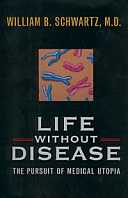 | Title: Life without disease: the pursuit of medical utopia Author: Schwartz, William B 1922- Published: University of California Press, 1998 Subjects: Science | Medicine | Economics and Business | History and Philosophy of Science | Public Policy Publisher's Description: The chaotic state of today's health care is the result of an explosion of effective medical technologies. Rising costs will continue to trouble U.S. health care in the coming decades, but new molecular strategies may eventually contain costs. As life expectancy is dramatically extended by molecular medicine, a growing population of the aged will bring new problems. In the next fifty years genetic intervention will shift the focus of medicine in the United States from repairing the ravages of disease to preventing the onset of disease. Understanding the role of genes in human health, says Dr. William B. Schwartz, is the driving force that will change the direction of medical care, and the age-old dream of life without disease may come close to realization by the middle of the next century. Medical care in 2050 will be vastly more effective, Schwartz maintains, and it may also be less expensive than the resource-intensive procedures such as coronary bypass surgery that medicine relies on today.Schwartz's alluring prospect of a medical utopia raises urgent questions, however. What are the scientific and public policy obstacles that must be overcome if such a goal is to become a reality? Restrictions on access imposed by managed care plans, the corporatization of charitable health care institutions, the increasing numbers of citizens without health insurance, the problems with malpractice insurance, and the threatened Medicare bankruptcy - all are the legacy of medicine's great progress in mastering the human body and society's inability to assimilate that mastery into existing economic, ethical, and legal structures. And if the average American life span is 130 years, a genuine possibility by 2050, what social and economic problems will result?Schwartz examines the forces that have brought us to the current health care state and shows how those same forces will exert themselves in the decades ahead. Focusing on the inextricable link between scientific progress and health policy, he encourages a careful examination of these two forces in order to determine the kind of medical utopia that awaits us. The decisions we make will affect not only our own care, but also the system of care we bequeath to our children. [brief] Similar Items |
| 62. | 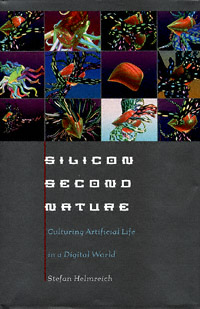 | Title: Silicon second nature: culturing artificial life in a digital world Author: Helmreich, Stefan 1966- Published: University of California Press, 1998 Subjects: Science | Computer Science | Biology | Technology and Society | Social Theory | Cultural Anthropology | California and the West Publisher's Description: Silicon Second Nature takes us on an expedition into an extraordinary world where nature is made of bits and bytes and life is born from sequences of zeroes and ones. Artificial Life is the brainchild of scientists who view self-replicating computer programs - such as computer viruses - as new forms of life. Anthropologist Stefan Helmreich's look at the social and simulated worlds of Artificial Life - primarily at the Santa Fe Institute, a well-known center for studies in the sciences of complexity - introduces readers to the people and programs connected with this unusual hybrid of computer science and biology.When biology becomes an information science, when DNA is downloaded into virtual reality, new ways of imagining "life" become possible. Through detailed dissections of the artifacts of Artifical Life, Helmreich explores how these novel visions of life are recombining with the most traditional tales told by Western culture. Because Artificial Life scientists tend to see themselves as masculine gods of their cyberspace creations, as digital Darwins exploring frontiers filled with primitive creatures, their programs reflect prevalent representations of gender, kinship, and race, and repeat origin stories most familiar from mythical and religious narratives.But Artificial Life does not, Helmreich says, simply reproduce old stories in new software. Much like contemporary activities of cloning, cryonics, and transgenics, the practice of simulating and synthesizing life in silico challenges and multiplies the very definition of vitality. Are these models, as some would claim, actually another form of the real thing? Silicon Second Nature takes Artifical Life as a symptom and source of our mutating visions of life itself. [brief] Similar Items |
| 63. | 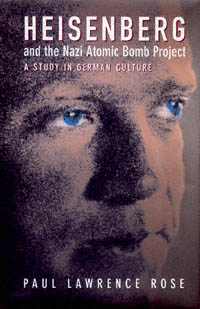 | Title: Heisenberg and the Nazi atomic bomb project: a study in German culture Author: Rose, Paul Lawrence Published: University of California Press, 1998 Subjects: History | European History | German Studies | European Studies | Science | Technology and Society | Physics | History and Philosophy of Science Publisher's Description: No one better represents the plight and the conduct of German intellectuals under Hitler than Werner Heisenberg, whose task it was to build an atomic bomb for Nazi Germany. The controversy surrounding Heisenberg still rages, because of the nature of his work and the regime for which it was undertaken. What precisely did Heisenberg know about the physics of the atomic bomb? How deep was his loyalty to the German government during the Third Reich? Assuming that he had been able to build a bomb, would he have been willing? These questions, the moral and the scientific, are answered by Paul Lawrence Rose with greater accuracy and breadth of documentation than any other historian has yet achieved.Digging deep into the archival record among formerly secret technical reports, Rose establishes that Heisenberg never overcame certain misconceptions about nuclear fission, and as a result the German leaders never pushed for atomic weapons. In fact, Heisenberg never had to face the moral problem of whether he should design a bomb for the Nazi regime. Only when he and his colleagues were interned in England and heard about Hiroshima did Heisenberg realize that his calculations were wrong. He began at once to construct an image of himself as a "pure" scientist who could have built a bomb but chose to work on reactor design instead. This was fiction, as Rose demonstrates: in reality, Heisenberg blindly supported and justified the cause of German victory. The question of why he did, and why he misrepresented himself afterwards, is answered through Rose's subtle analysis of German mentality and the scientists' problems of delusion and self-delusion. This fascinating study is a profound effort to understand one of the twentieth century's great enigmas. [brief] Similar Items |
| 64. | 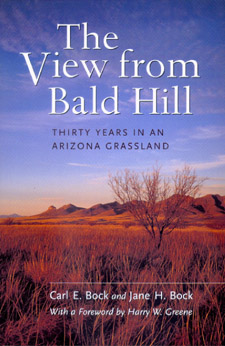 | Title: The view from Bald Hill: thirty years in an Arizona grassland Author: Bock, Carl E 1942- Published: University of California Press, 2000 Subjects: Environmental Studies | Conservation | California and the West | Ecology | Natural History | Science | Biology | Botany | Zoology Publisher's Description: In 1540 Francisco Vasquez de Coronado introduced the first domestic livestock to the American Southwest. Over the subsequent four centuries, cattle, horses, and sheep have created a massive ecological experiment on these arid grasslands, changing them in ways we can never know with certainty. The Appleton-Whittell Research Ranch in the high desert of southeastern Arizona is an 8,000-acre sanctuary where grazing has been banned since 1968. In this spirited account of thirty years of research at the ranch, Carl and Jane Bock summarize the results of their fieldwork, which was aimed at understanding the dynamics of grasslands in the absence of livestock. The View from Bald Hill provides an intimate look at the natural history of this unique site and illuminates many issues pertaining to the protection and restoration of our nation's grasslands. [brief] Similar Items |
| 65. | 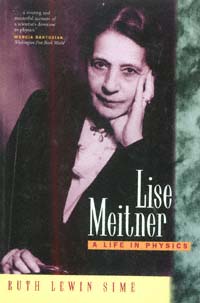 | Title: Lise Meitner: a life in physics Author: Sime, Ruth Lewin 1939- Published: University of California Press, 1997 Subjects: Science | Physics | Autobiographies and Biographies | Women's Studies | History | History and Philosophy of Science Publisher's Description: Lise Meitner (1878-1968) was a pioneer of nuclear physics and co-discoverer, with Otto Hahn and Fritz Strassmann, of nuclear fission. Braving the sexism of the scientific world, she joined the prestigious Kaiser Wilhelm Institute for Chemistry and became a prominent member of the international physics community. Of Jewish origin, Meitner fled Nazi Germany for Stockholm in 1938 and later moved to Cambridge, England. Her career was shattered when she fled Germany, and her scientific reputation was damaged when Hahn took full credit - and the 1944 Nobel Prize - for the work they had done together on nuclear fission. Ruth Sime's absorbing book is the definitive biography of Lise Meitner, the story of a brilliant woman whose extraordinary life illustrates not only the dramatic scientific progress but also the injustice and destruction that have marked the twentieth century. [brief] Similar Items |
| 66. | 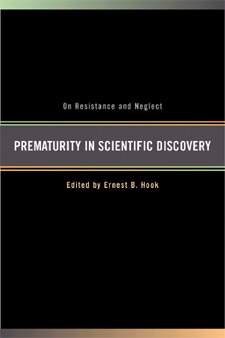 | Title: Prematurity in scientific discovery: on resistance and neglect Author: Hook, Ernest B 1936- Published: University of California Press, 2002 Subjects: Science | History of Science | Social and Political Thought | Geology | Evolution | Physics | History of Medicine Publisher's Description: For centuries, observers have noted the many obstacles to intellectual change in science. In a much-discussed paper published in Scientific American in 1972, molecular biologist Gunther Stent proposed an explicit criterion for one kind of obstacle to scientific discovery. He denoted a claim or hypothesis as "premature" if its implications cannot be connected to canonical knowledge by a simple series of logical steps. Further, Stent suggested that it was appropriate for the scientific community to ignore such hypotheses so that it would not be overwhelmed by vast numbers of false leads. In this volume, eminent scientists, physicians, historians, social scientists, and philosophers respond to Stent's thesis. [brief] Similar Items |